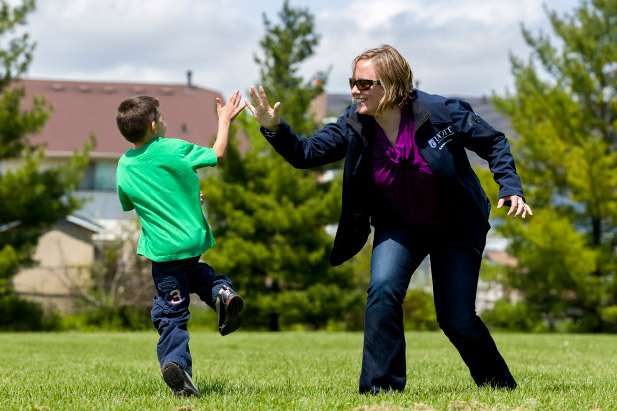University researcher promotes inclusion through movement for kids with Autism Spectrum Disorder
April 19, 2017

Autism Spectrum Disorder (ASD) may have greater public awareness than ever before, but a researcher at the University of Ontario Institute of Technology says challenges associated with ASD are still mired by misconception.
“People sometimes think they ‘know’ what ASD is because they have met one person or a small number of people with ASD,” says Meghann Lloyd, PhD, Associate Professor, Faculty of Health Sciences. “The truth is most do not realize the full extent of the spectrum of abilities and challenges for people with ASD.”
Dr. Lloyd’s extensive research expertise includes ASD, fundamental motor skills and play. She currently investigates how to intervene and improve motor skills for developmental benefits.
“Autism Spectrum Disorder is a neurodevelopmental disorder defined by challenges in social skills, communication and a range of restricted interests or behaviours,” explains Dr. Lloyd. “It is a spectrum where no two people are truly alike. Most children with ASD also have challenges in their motor skills and therefore have reduced opportunities to engage in active play, sport and recreation with their peers.”
To show how attitudes toward ASD are evolving, the popular children’s show Sesame Street recently added its first character in more than a decade: one with ASD. Julia, the newest ‘Muppet’ on the program, is an attempt by Sesame Street to facilitate inclusion and show children that young people with ASD are just like them.
Sesame Street’s longtime writer, Christine Ferraro says inclusion is at the heart of the character being on the show.
“I would love her to be not Julia, the kid on Sesame Street who has autism . . . I would like her to be just Julia,” says Ferraro.
“Julia has the potential to have a huge impact on the ASD community,” says Dr. Lloyd. “A whole generation of children will grow up with an increased understanding of the differences and challenges Julia experiences. Children with ASD will not be ‘strange’ or something to be feared.”
Dr. Lloyd will represent the University of Ontario Institute of Technology at a TEDx Talk speaking event at York University in Toronto on Saturday, April 22. The title of her discussion is Learning to move and moving to learn. The event will feature dozens of other speakers under the theme of ‘Autism Innovations’.



